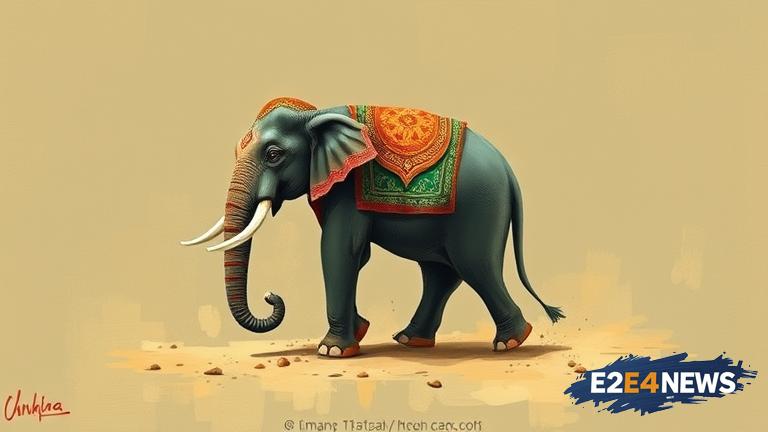The Maharashtra government has announced its decision to file a review petition in an attempt to bring back elephant Madhuri from the Vantara sanctuary in Gujarat. This move comes after a recent court order allowed Madhuri to stay at the sanctuary, citing her well-being and safety as the primary concerns. The government’s decision has sparked a heated debate, with many animal welfare organizations and experts weighing in on the issue. Madhuri, a 17-year-old elephant, was initially housed at the Mumbai zoo, but was later shifted to the Vantara sanctuary due to concerns over her health and living conditions. The Maharashtra government had argued that Madhuri was an integral part of the state’s cultural heritage and should be returned to her original home. However, the court’s decision has been seen as a significant victory for animal welfare advocates, who have long been campaigning for better treatment and living conditions for elephants in captivity. The review petition is expected to be filed in the coming weeks, with the government arguing that the court’s decision was based on incomplete information and that Madhuri’s return to Maharashtra is essential for the state’s cultural and tourism interests. Meanwhile, animal welfare organizations have expressed concerns over the government’s motives, citing the potential risks and stress that Madhuri may face if she is forcibly relocated. The Vantara sanctuary has been praised for its state-of-the-art facilities and expert care, and many believe that Madhuri is better off staying there. The case has also highlighted the need for better laws and regulations governing the treatment and care of elephants in captivity. As the debate rages on, it remains to be seen whether the government’s review petition will be successful in bringing Madhuri back to Maharashtra. The elephant’s well-being and safety should be the top priority, and it is essential that any decision made is in her best interests. The Maharashtra government’s decision to file a review petition has been met with criticism from many, who believe that the government is prioritizing its own interests over the welfare of the elephant. The case is a complex one, with many factors at play, and it will be interesting to see how it unfolds in the coming weeks and months. The court’s decision to allow Madhuri to stay at the Vantara sanctuary was based on expert testimony and evidence, and it is essential that any future decisions are made with the same level of care and consideration. The Maharashtra government’s motives have been questioned by many, with some believing that the government is more interested in exploiting Madhuri for tourism purposes than in ensuring her well-being. The Vantara sanctuary has a proven track record of providing excellent care for elephants, and it is essential that Madhuri is allowed to stay there if it is in her best interests. The case has also highlighted the need for greater transparency and accountability in the treatment and care of elephants in captivity. As the situation continues to unfold, it is essential that the welfare of Madhuri and other elephants like her remains the top priority. The Maharashtra government’s decision to file a review petition has significant implications for the future of elephant conservation and welfare in the state. The government must prioritize the well-being and safety of Madhuri and other elephants, and ensure that any decisions made are in their best interests. The case is a wake-up call for the need for better laws and regulations governing the treatment and care of elephants in captivity, and it is essential that the government takes immediate action to address these concerns. The Vantara sanctuary has set a high standard for elephant care, and it is essential that other sanctuaries and zoos follow suit. The Maharashtra government’s decision to file a review petition has sparked a heated debate, and it remains to be seen how the situation will unfold in the coming weeks and months. The welfare of Madhuri and other elephants like her must remain the top priority, and it is essential that any decisions made are in their best interests.





